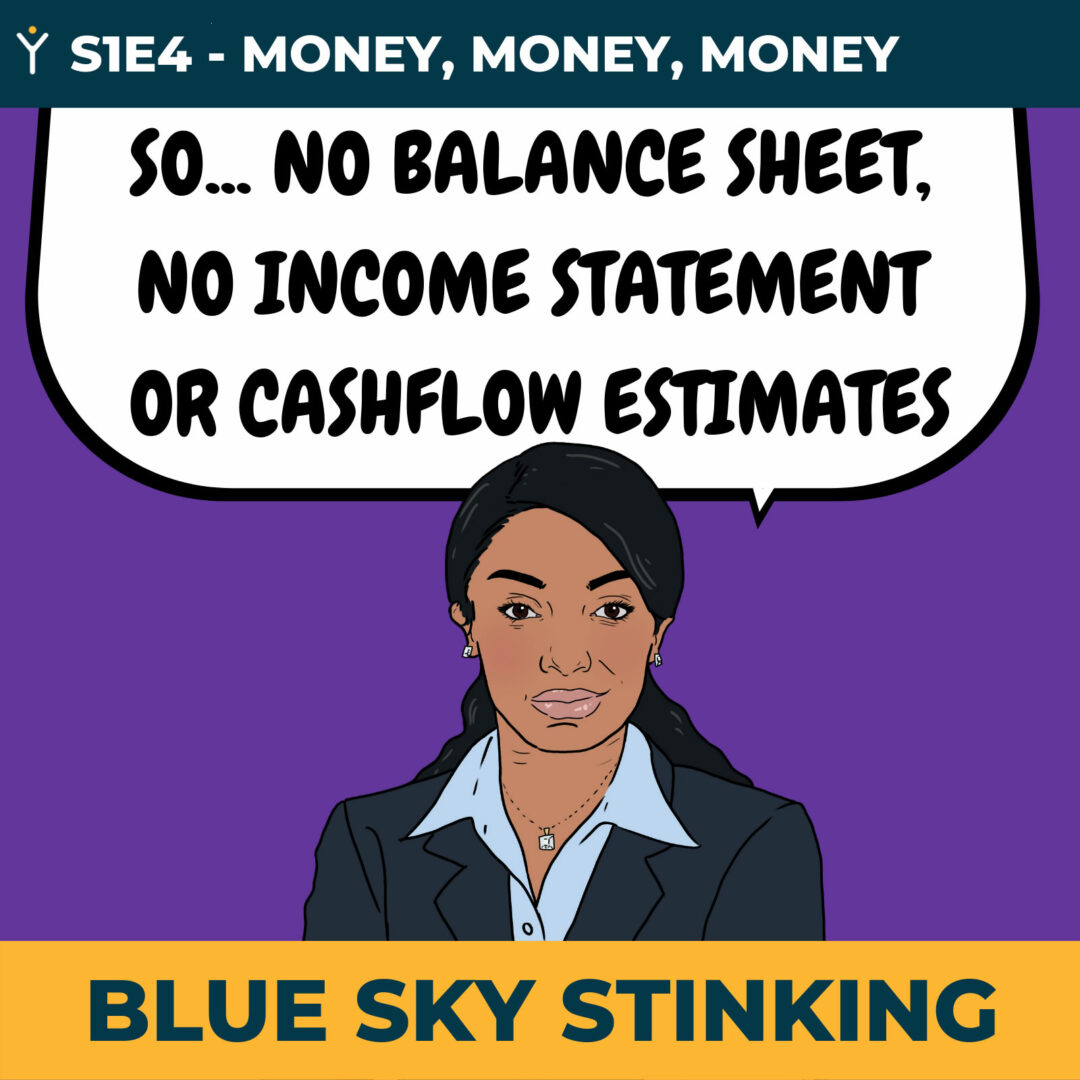
Timings
- 00:15 - Scene 4.1 A Matter of Equity
- 05:28 - Scene 4.2 The Devil and the Angel
- 06:52 - Scene 4.3 It's Katherine Kash
- 09:25 - Discussion with Dan Orasnjak
- 09:48 - Lang Bennetts Introductions
- 11:04 - Organisational Structures
- 14:30 - Share allocation
- 16:00 - Equity
- 17:48 - Angel Investors
- 19:25 - Investor exit strategy
- 20:11 - Partnership and Shareholder agreements
- 21:32 - Lessons: Sole Trader tax return planning
- 24:15 - Lessons: Enterprise Investment Scheme traps
- 26:00 - Top tips for Start-ups
- 27:40 - Research and Tax Credits
- 28:32 - What's next?
Useful Information
Organisational Structure (@11:04)
Shares and Equity (@14:30)
Investors (@19:25)
Top tips for those thinking of starting a business (@26:00)
- Know your market
- Prepare Profit and Loss forecasts
- Understand your cash flow
- Plan for your tax
- See a professional sooner rather than later
- Know where you are going
Episode script
CONTINUITY: Zelda and Jakob meet, once again, in her temporary office at the Dog and Bone. Zelda sits staring intently at the screen of a brand-new laptop.
JAKOB: Morning Zelda, thought I’d find you here… You found any premises yet?
ZELDA: I’ve been negotiating with dad on the vacant industrial unit he has on the Bunkum Industrial Estate
JAKOB: And how has that been going?
ZELDA: Well, he keeps mentioning money and I keep reminding him that I’m his only daughter and I’ve never asked for anything… Like this!
JAKOB: And his response was…
ZELDA: He knocked 20% of the rental price
JAKOB: Well, that’s not bad
ZELDA: To £5000 a month
JAKOB: Holy smoke! What size is this place?
ZELDA: I think he said 12 and half thousand square feet
JAKOB: (Choking) So, you haven’t been to see it yet! Let me have a chat to him about it. I am a bit concerned that you are aiming too big as a start up. Why would you need all that space?
ZELDA: Well, the product needs a lot of people in manufacturing. Automating it with machinery will reduce the space needed but adds more expense. Look, I have been working out the options (passing her mass of paper work over the table)
JAKOB: You have been busy… (Flicking through the first pile). I think I need to introduce to you one of my team, Katherine. She’s my money whizz and can help you put a realistic finance plan together.
ZELDA: Oh that would be great… That will be weight off my mind.
JAKOB: Katherine will help you put it together, not do it for you.
ZELDA: Oh, ok… I’ve got other things to do, but I guess th..th..that’s fine
JAKOB: That brings me onto another matter. I’m ready to register Sydeline with Companies house and we need to decide on the shares
ZELDA: Well, 1 share for me… That’s it isn’t it
JAKOB: Ok, right… So… What about me?
ZELDA: (Sweetie) You’re my Angel?!
JAKOB: Yes… Yes I am. (Dwelling on the way Zelda said it) OK, let’s put it another way. What are you putting into the business
ZELDA: 110%
JAKOB: Money-wise!
ZELDA: Oh, well… I could put my savings in, thats about 18,000
JAKOB: Riiiiight! What about your apartment?
ZELDA: Dad bought that for me
JAKOB: I know, but you’re lucky to not have a mortgage on it then – you could put that on the table too – you are serious about this business aren’t you?
ZELDA: Yes, yes, absolutely. Oh heck, I thought you and dad would help me get going!
JAKOB: Well your dad hasn’t handed the key of that industrial unit over for nothing so I would suspend that idea for a while. And, as you said, I’m an Angel Investor, I am looking for a return on my time and money.
ZELDA: But you’re stinking rich
JAKOB: True, but you don’t get rich giving it away… Although everyone thinks you should once you’ve got it!
ZELDA: So you want… What.. 10% of the business?
JAKOB: (Gathers thoughts) Let’s do the maths for a second. You’ve got 18k and, let’s say we can raise 180k with a mortgage on the apartment..
ZELDA: What… Oh.. yeah (down-heartened)
JAKOB: My rough estimates are that to fit out that, or a smaller unit, and hire people and buy stock and other costs – Katherine can help with all this – is going to be (sucking thru teeth) 1 to 2 million? So, I should have the 90%! (Big smile)
ZELDA: (Lengthy stunned silence)
JAKOB: Wh..what are you thinking?
ZELDA: (Puffing, whistles and grunts) 50/50?
JAKOB: Done! I’ll start the company with 200,000 shares and we can have 100,000 each – that will give us flexibility in the future
ZELDA: (Still stunned) 100,000 shares, sure, great, thanks?
JAKOB: I’ll drop you my standard investors agreement over by email, Have you got your Sydeline domain done yet? Oh and I’ll go and pin your dad down on that industrial unit. Lovely to see you Zelda (disappearing quickly)
ZELDA: (Bewildered) Yeah, goodbye, ummm, J. Agreement, good, yep, super… Domain… (shouting after him) Hold on what’s the domain thing again
CONTINUITY: Somewhat irritated, Jakob bursts into Nero’s office fresh from meeting Zelda
JAKOB: You are a bit of git Zero
NERO: (With wry smile and faux innocent voice) Who me? What have I done to offend you so Jake
JAKOB: JAKOB! Grrr… 60 grand a year for a crappy industrial unit on Bunkum
NERO: Blimey, you are taking it seriously… Ok, ok, I just wanted to see if she would research what a unit should go for on Bunkum. I started high and ended… High. Hehe!
JAKOB: She’s your daughter!
NERO: And the subject of a significant bet for over half my company – you think I should help you win?
JAKOB: Yes… Well (calming down) No, of course not.
NERO: (Going all professional) So, Mr Ja-Kob Oakstock, are you here to negotiate for one of my properties on Bunkum Industrial Estate?
JAKOB: Yes… Wait, “one of my properties”. How many have you got?
NERO: 8, 3 of which are vacant
JAKOB: And the one you offered to Zelda…
NERO: Is the biggest and most dilapidated (big grin)
JAKOB: I repeat my greeting with a modification – You are a gigantic git Zero (smiling)
NERO: Let’s do a real deal then. I may even be nice.
CONTINUITY: Back to the Dog and Bone where Zelda is approached by a professional looking woman
KATHERINE: H…hello, Are you Zelda Zero?
ZELDA: Yes, yes I am. And you are?
KATHERINE: I thought so, I recognised you from all your Facebook pictures. I’m Katherine Kash, Jakob said you are camping out here whilst you get premises sorted (holding hand to be shook)
ZELDA: Oh, yes, Kat, lovely to meet you. (Enthusiastically shaking hands) Really good of you to pop in and see me.
KATHERINE: No problem. By the way I don’t really like being called Kat
ZELDA: Kitty… Ooo Kitty Kash, that sounds like…
KATHERINE: It’s Katherine, just Katherine… Katherine
ZELDA: Katherine, ok. Glad we got that sorted.
KATHERINE: Jakob suggested you need some support in sorting your financial plan
ZELDA: Oh yes please (relieved). Here are my notes so far.
KATHERINE: Wow, that’s a lot of paper. Have you got any forecasts of your revenue?
ZELDA: Fooorrre…casssts… (Unclear)
KATHERINE: Ok, maybe too early. What are you projected setup costs?
ZELDA: Ah (shuffling through the mass of paper) I’ve had a few ideas on my options
KATHERINE: Oh, ok (flicking through), right, yes, uh huh. So which of these is the most beneficial option
ZELDA: I don’t know, that’s what Jakob thought you could help with
KATHERINE: Oooh, That was nice of him. Have you got any of this on spreadsheet instead of paper?
ZELDA: Ahh, well, you see, I only got this Laptop the other day and I’ve only got email and the internet … I think
KATHERINE: So, no Balance Sheet, Income Statement or CashFlow estimates
ZELDA: Uhhh, no!
KATHERINE: Can I take these and review them? (Getting up)
ZELDA: Sure, don’t lose them though, I don’t have any copies
KATHERINE: Sure thing, I’ll get them back to you as soon as I’ve spoken to Jakob
ZELDA: Great, (shouting after her rapid exit) nice to meet you K, uh, Kit, uh Katherine
Business Finance Setup Discussion Transcript
RUSSELL: Ah, at last! We seem to have someone on the scene who knows what they are doing. Now you may think I’m talking about Kat, sorry, Katherine Kash, but I am, today, sitting in the offices of Lang Bennetts in Truro with Dan Orasnjak. Hi Dan
DAN: Hi, nice to be here
RUSSELL: Thanks very much and thanks for joining us. So, before we dive into our discussion on Money, Money, Money, perhaps you could you tell us a little about Lang Bennetts
DAN: Lang Bennetts are an Independent chartered accountancy practice based in Truro. Also with an office in Falmouth. We have grown rapidly over the past three years.. We’ve gone from 30 staff, 3years ago, to 60 staff today. So there’s been rapid organic growth of the last 3 years. We offer a full range of accountancy services. From Payroll, bookkeeping, tax preparation, tax compliance and tax advisory to a variety of clients, be it small start ups all the way through to large established household names.
RUSSELL: Brilliant, so how about yourself, what are your credentials?
DAN: I am a chartered accountant and a chartered tax advisor with over 10 years practice experience. Dealing with a range of clients from start-up and very small, all the way through to large established household names
RUSSELL: So we can trust you to give some good advice then!
DAN: I hope so.
RUSSELL: Perhaps then, we could just go back to the first discussion, or the first part we heard about Jakob and Zelda’s respective shares in the business. I think that’s an area that can cause a lot of confusion. It certainly did to us in the early days and we thought we’d done well with a thousand shares. They’ve chosen to go down a limited company route; would that be a reasonable decision do you think?
DAN: The limited company route can work for a couple of reasons. The first is limited liability. The company has liability for debts etc, whereas, if it was formed personally, as a sole trader or partnership, there’d be unlimited liability on the individuals involved. So that’s one reason we see limited companies used. The other is: it’s a tad more straight forward to exchange shares, to change ownership between the individuals or introduce new owners if you need to down the line. There are also reliefs for investors, such as the Enterprise Investment Scheme and Seed Enterprise Investment Scheme which are corporate reliefs for companies. They’re only available for Limited Company structures. So it does facilitate itself for new investors down the line and there are tax breaks for this, which new investors find quite appealing. So the two together can aide raising capital. That said, it’s not right for everyone but limited company can be a good option in some circumstances.
RUSSELL: You mentioned or alluded to a couple other routes. What other options could they have considered
DAN: They could have considered being a partnership. Now there are two routes here, there’s a normal partnership or a Limited Liability Partnership. They’re both very similar but as the latter suggests, there’s limited liability. So it’s slightly more akin to a company in terms of liability as we discussed earlier. That’s actually not a bad decision when you are a young business and you’re possibly not sure where things are going to go in the immediate future. There’s low administration burden with a partnership, and it’s slightly more flexible in allocating profit shares informally. There is always the option as well to start life as a partnership and incorporate into a Limited Company down the line. That’s an attractive option that we see for some start-up businesses that might not know where they’re going to go in the future. That might be a big thing or they might stay as a small trade and a partnership in those instances isn’t a bad idea. Like I say, we can always turn that partnership into a limited company if we start finding that the partnership is very big and for reasons of liability or a tax saving and limited company might then be more appealing
RUSSELL: Ok, So, going back to the limited company. They are obviously seeking to register that company on Companies House and we mentioned that in podcast episode 2. Why would starting with 200,000 shares be a good idea? Seems a ridiculously high number for two people.
DAN: I would ask the same question. I wouldn’t initially recommend starting with 200,000 shares. There is no reason why you couldn’t start the company with 1 share each or 5 shares each or 10 shares each. You could still put the same amount of money in. It’s the percentage ownership that is the key issue and there is no need to put in £200,000 in share capital. It does have an attractive feature of, what we’d call, strengthen the balance sheet. It’s locked in as share capital, so to speak, whereas a loan may to the company would be repayable, possibly on demand, depending on the terms of the loan. So it’s slightly less strong if a loan’s made but I would much rather see, especially in a start-up more minimal shares. Might be a hundred shares split between them or maybe a thousand shares split between them and the rest contributed as, what’s called, share premium or a loan. I don’t see the need for 200,000 shares straight away would be my initial assessment here, and my advice more than likely. Unless there were special circumstances that warranted 200,000 shares. That would be exception rather than the norm in my experience.
RUSSELL: Perhaps Jakob’s got some other plans in mind
DAN: Possibly
RUSSELL: Whats going on in Jakob’s head at the moment? Jakob wrangled a 50/50 percent equity share – would that be expected by an investor normally?
DAN: It would quite often depend on the stage the business is currently at. In this case, as there is no trading history and not much in the way of financial forecasts, I don’t think a 50/50 split is unreasonable. If somebody was looking to invest in a more established business that had a history of profits, had a history of cashflow, had a history of dividends, you might see a smaller share given because the business has more bargaining power, so to speak. In this case, I think 50/50, probably, is fair enough given that Jakob is, potentially, taking quite a large risk here
RUSSELL: Including the DB5
DAN: Including the DB5! It’s obviously down to the two entities to negotiate and the strength of the hand on each side will be dictated by how long the business has been trading for, its strength, its history, and where it’s going next. The better it can demonstrate where it’s going next the more it has a stronger hand and can get more money for less amount of shares.
RUSSELL: Jakob is probably trying to limit his losses, if he loses anything, apart from the DB5, with 50% he should have some access to the assets of the business.
DAN: Exactly, and with 50% he should have some good upside if the business ends up doing well. It’s probably warranted in this instance.
RUSSELL: I’ve always had this question bubbling in the back of my head about Dragons Den. You see this thing on TV an it has painted an interesting picture of investors. It’s not necessarily one that I’ve experienced It might be appropriate to ask what an angel investor is, at this point? Because some people might not understand what that is
DAN: It can vary. An angel investor is somebody who puts some money into a business and through contacts or experience or a combination of those, will try and help the business grow and take it to new levels. They have a similar interest as the business owner, they own a percentage. They want this business to do as well as possible and that way everyone receives a good pay off. I think, in terms of what an angel investor is. A business should ask questions when an angel investor comes their way or they’re seeking an angel investor. Some of these would be such as, what involvement do you perceive yourself taking here and what can you add to the business?Do they have any experience in that business area? Do they have contacts in that business area? And if so, how involved are they personally going to be? Are you going to hear from them at all, daily, weekly, monthly, annually? What’s their anticipated level of involvement? What’s their expertise? Look at track record. Look at what they’ve done before. See how they can add value to your business. Another key question that needs to be asked, and every angel investor varies, is what’s the exit strategy? How long do they see themselves being involved? And when do they want to receive a pay-off? Because, no doubt, they’ve invested to make money and do they see a company sale in two years, three years, five years? How do we want to end this and how are we going to determine that both parties are going to receive their cash at the end of it? What are our timescales? I think they vary, but that is the general picture and those are the general questions I would certainly be asking to find out what type of angel investor they are and more about the arrangement.
RUSSELL: Ok. So the investor agreement that Jakob alluded to in there is probably quite a legitimate thing to have. It would describe what his role has been, what he’d expect out of the business maybe.
DAN: That’s key. Now you’ve touched on that, I would certainly say when you go into business with anyone, be it partnership, be it limited company, you need either a partnership agreement or a shareholders agreement. So many times we seen people go into business we’ve suggested one of those documents, if it was a partnership or a limited company accordingly. They’ve said we’re never going to fall out with this person, we’ll always have a pint together and we’ll always arrange. If any situation comes up, there’s nothing we can’t fix. Nine months later, there’s a situation that’s come up that they can’t fix. It happens all the time. Be it trivial to quite complicated. A simple pretext down, between them, just agreeing simple things would have saved a lot of hassle and fees down the line. So a shareholders agreement or partnership agreement is absolutely key, it cannot be overlooked.
RUSSELL: Ok, that’s good advice. That brings me to a point – you’ve probably seen some pretty poor financial planning and decision making in your career. Have you got any examples you could share and any lessons seen people learn the hard way?
DAN: Yes! I think a couple come to mind. One very simple problem that I have seen on numerous occasions is somebody who is a sole trader or a partner in a business, is still liable to self-assessment on the business profits. Now what we tend to see happen is a sole trader or partner takes all the business profits as they go. They’re not taxed at source I.e. They’re not subject to PAYE, because they have to do self-assessment. They end up doing a tax return in, what can be, 18 months after the business starts and they get a huge stock when the tax return covers the profits to date plus it want’s a down payment towards next years tax to bring you fully up to date. Now, we’ve quite often seen the business owner, having spent all the business proceeds, and this can be quite large tax bill which catches them by surprise. So anyone who comes in I tend to sit them down and actually forecast their tax bill, given the money they are making. I forecast their tax bill that might be due in a year, 18 months or even 2 years time. And then, with that, they know what they’ve got to put away into a separate tax account or hold somewhere and have sufficient funds so they can pay that tax bill. We’ve had to get some clients on a payment arrangement with HMRC or I’ve had some clients that have actually had to take out a loan to pay the tax. So without that it could have been very serious.
RUSSELL: That does lead to one of the statistics that I read a little while ago that 73% of new start-up are brought down by HMRC.
DAN: That would not surprise me. And it’s some thing that I really do stress, when they start their business. This is one of the key risks. If they don’t save for this, however good their business is, they risk going under if they can’t pay this liability. Such simple steps can be put in place to prevent this. It’s a shame to see it happen. So if people come here, for a meeting, we make sure this is set out and a pathway is given to them early on, so they know their liabilities as they arise.
Thats a common thing I see in the sole trade, partnership arena. Limited company, on the the theme we’ve got here, there is a relief called Enterprise Investment Scheme, which is a very attractive relief for investors. Very attractive, but also very complicated. I’ve seen, sadly, some companies have a go at this themselves. You’re entitled to it, you don’t have to engage somebody to run you through it. But the rules here are so complicated. It’s full of traps. I have seen a company raise funds through some private individuals who thought they were getting a substantial tax relief on giving the money. Sadly, the company broke numerous rules on the EIS relief and I believe, I didn’t act for the individual investors, but, in my opinion, the EIS was invalid. So, one lesson there, is if you do an EIS scheme, engage a professional, it really is that complicated. The reliefs are fantastic but it does need to be done right. There’s a lot of box ticking to do. There’s a lot of things and a lot of rules you mustn’t break and a clear plan needs to be adhered to. I would recommend engaging a professional in that area.
RUSSELL: It’s certainly what we did. And we did get advantage of that and our investor did as well. It was very successful and beneficial to us. So finally, and wrapping up all the advice you’ve given in there, have you got any tips, what top tips would you give to people that are thinking of starting a business?
DAN: I’d say, know your market. Prepare profit and loss, revenue, cost forecast going forwards as far as possible. With that, make sure you include cashflow. Because cashflow, for a start-up, is potentially more important than your profit and loss. Because of where this cash goes in and comes out. Quite often it can go out early and come in slow and hence, that can be a real hole in the finance. Plan for your tax and see a professional as soon as possible in terms of accountancy professional, legal professional. Just to make sure your structure is set-up right from day one. That’s sole trade, partnership, limited company and know where you want to take it going forwards. Then, with the plan in place, you can achieve whatever you want but it’s very wise to set out that plan early because, if you make a wrong step early on, unwinding that plan, if you want to come out of a company, or you’ve setup 3 companies and you want to make 1 company; down the line it can be hard to unwind these thing. So, getting it right first is definitely the way to proceed.
RUSSELL: So ,thanks for that Dan. We remain delighted to have you and Lang Bennetts as our Accountants and I’m sure we’ll be back to talk on another finance subject in the near future. Any that jump to mind that we should cover?
DAN: I think research and development tax credits are a big area that certainly should be looked at and covered in more detail. We’ve found, in fact, we’ve picked up a few clients lately where we’ve seen they had an eligible research and development tax credit claim and this has been missed by other accountants. We’ve amended previous tax returns and done current tax returns with a valid research and development tax credit claim in them. So very valuable relief and something we see missed quite a lot and an awareness of this for businesses out there would certainly be a good idea.
RUSSELL: Yeah, well it’s something we took advantage of and will do so again. If it’s still around. Hopefully it will stay available. Well, that just leaves me to thank you all for listening to Blue Sky Stinking from Gydeline. As ever, please like, comment, share and even volunteer as a future guest speaker – it’s wasn’t that bad was it Dan?
DAN: No, no! Thoroughly enjoyed it.
RUSSELL: Excellent! Next time Sydeline suffers a breach in confidentially in Knowing Me, Knowing You (uh huh).
with special thanks to...
Dan Orasnjak is an experienced Chartered Accountant working for Lang Bennetts. Lang Bennetts, which have offices in Truro and Falmouth in Cornwall, provide a comprehensive range of finance services for start-ups through to large enterprises.









